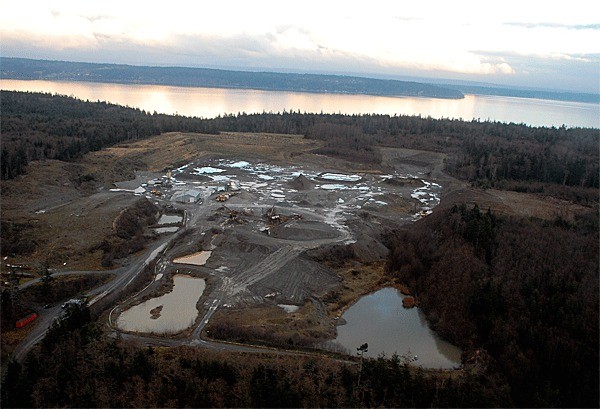A Central Whidbey gravel mining company with a history of violating environmental rules will be able to expand its operations into the 100 acres surrounding the site located north of the Greenbank Farm.
Island County Hearing Examiner Michael Bobbink issued his final decision this week, approving the request from Rempel Brothers Concrete, Inc., for expansion, but with a long list of conditions aimed at protecting neighbors.
Yet the neighbors aren’t likely to be satisfied.
“I’m disappointed. I guess gravel is more important than our lives,” said Debbie Vrungos, a resident of the neighboring Ellwood neighborhood and an outspoken critic of the expansion.
“Hopefully the county will keep a better eye on them than they have in the past,” she added.
Bobbink imposed the conditions suggested by staff, which include groundwater monitoring, a limit on the depth of excavation to 20 feet above the aquifer and a limit on excavation to seven acres at a time. In addition, Bobbink added that the company has to completely screen neighbors from excavation with trees or fences.
The company’s history of violating environmental rules was a focus of both a planning staff report and a Jan. 6 hearing examiner meeting in which neighbors and environmental activists urged Bobbink to deny the expansion, or at least put strict limits on the operation.
“The prior penalties have not altered their behavior,” said resident Lew Brantley, who added that he doubts the county has the ability to monitor if the conditions have been followed.
On the other side, several people said environmental protections have improved at the site in recent years.
“Rempel has and will create living wage jobs in Island County,” Clinton resident Wayne Morrison said. “Living wage jobs are badly needed in Island County.”
During the hearing, both Bobbink and officials from Rempel Brothers emphasized that the company has been in compliance with permit requirements since the end of 2008. The company officials withdrew the original application because of the problems, then re-submitted after they were fixed.
“There’s been mistakes made, but there hasn’t been any problems for a lot of years,” co-owner Bruce Rempel said during the hearing. He added that the site has a complex system for recycling water and has a vested interest in the aquifer.
“Some people have said they’ve seen a big improvement at the site and I think that’s true,” he said.
Rempel Brothers was first penalized in 1997 for failing to meet a deadline for installing pollution controls. Then in 1999 the company was fined $14,000 by the state for releasing untreated concrete wastewater into a drainage ditch and not reporting the incident for nine months.
In 2003, the county planning department sent the company a letter stating that it was out of compliance with a number of conditions of the permit, including violation of a 100-foot vegetation buffer. Three years later, the county sent another letter stating the operation was still out of compliance and no progress had been made.
But the most egregious violation, according to several neighbors, occurred in 2004. The state Department of Ecology received a tip that the Rempel Brothers had buried several pieces of heavy equipment, including a front-end loader, on the property to avoid the cost of disposal. County health department officials had the company dig up the pieces of equipment and transport them to a recycling center.
Bobbink questioned Rempel about the incident.
“I’m not going to deny your permit because of it, but you should explain yourself,” Bobbink said, motioning to the crowd.
Rempel said company owners hired “an independent contractor” who buried the equipment without their knowledge. He said the offending contractor was “banned from the property” as soon as Rempel discovered what happened.
In an interview Friday, Vrungos said she understood that Bobbink was following the letter of the law in his decision, which may make an appeal difficult. Still, she said she has a “nagging concern” about the zoning of her neighborhood. It’s an issue that long-time resident Marcia Comer brought up at the hearing.
It turns out that the Ellwood neighborhood used to be zoned rural residential, which would have allowed them a 500-foot buffer from mining activities. But Vrungos said county officials switched the zoning to rural, which has less protection, in 1998 without alerting residents. She claimed a county employee said the zoning was changed to allow the gravel company to have more room to dig.
“It just doesn’t seem fair to accommodate a corporation at our expense,” she said.



